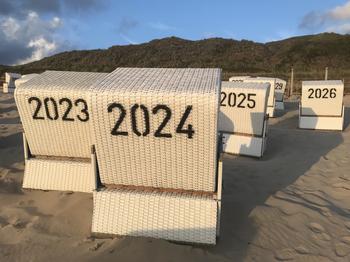2024 - 2025: The interview portal grows
News from Jan 03, 2025
A review and outlook at the turn of the year 2024/2025: More and more institutions are contributing their interview collections on various topics and eras to the ‘Oral-History.Digital’ interview portal. The platform is becoming more user-friendly, with features such as speech recognition and a help wiki. New projects are dedicated to legal issues and a cooperation with the National Research Data Infrastructure. Scientific articles and lectures present ‘Oral-History.Digital’ at various conferences and forums.
For the past 15 months, the Free University of Berlin has been operating the digital infrastructure ‘Oral-History.Digital’. At the turn of the year, the portal lists 41 archives with 3,770 interviews from numerous museums, foundations and universities.
Of these, around 2,200 interviews are accessible with audio or video after you registered for the portal, usually with a transcript and further information. This applies, for example, to the archive ‘Deutsches Gedächtnis’ at the Open University of Hagen, the Digital Interview Collections at the University Library of the Free University of Berlin and the 'Workshop of Memory' in Hamburg.
Over 30 institutions have signed contracts with the FU Berlin to make their collections accessible and available with Oral-History.Digital. New additions include the Charité Berlin, the Brandenburg Memorials Foundation and the NS Documentation Centre of the City of Cologne. New collections of interviews are dedicated to various topics such as the Radical Decree in West Berlin (FU Berlin) or the Dersim-massacres in Turkey (Ruhr University Bochum).
The platform was further expanded together with the project partners. New functions were added, bugs were fixed and usability was improved. A help wiki helps with research and supports archive owners in the individual steps of the development process.
The ‘ASR4Memory’ project at Freie Universität Berlin is developing a service for automated transcription. The collaboration with NFDI4Memory, the historical consortium of the National Research Data Infrastructure (NFDI), was intensified.
Oral-History.Digital was presented at conferences and in publications and discussed with researchers. Articles on the portal appeared in ‘o-bib. Das offene Bibliotheksjournal’ and in the “AKMB-news”.
The portal was presented at the Oral History Network Meeting in Erfurt, at the Spring Conference of University Archives in Oldenburg, at the conference ‘Nazi Persecution - Person Data and Data Standards’ in Munich, at a book presentation with interview analyses on Nazi forced labour, at the Long Night of the Sciences and the KOBV Forum in Berlin, in a lecture at the University of Prishtina, at a Polish-German oral history workshop at the University of Hagen and at the Swiss Society for History in Bern.
In 2025, the platform for audiovisual research data will be further developed together with the community. Import and export functions will be improved, as will the usability and security of the software.
Further collections of interviews are gradually being catalogued and made available. In cooperation with the Jewish Museum Berlin, Claude Lanzmann's audio archive is being transcribed and catalogued. The approximately 200 hours of audio interviews formed the research basis for his documentary film ‘Shoah’ (1985). The Archive ‘Deutsches Gedächtnis’ archive is putting two new collections online: the Wurzen study conducted by sociologist Cordia Schlegelmilch in a small town in Saxony in the early 1990s and around 300 interviews by filmmaker Loretta Walz with survivors of the Ravensbrück women's concentration camp.
In addition to NFDI4Memory, the FU Berlin will also be involved in the linguistic NFDI consortium ‘Text+’ from 2025. The project ‘Text+-Schnittstellen zu den Interview-Sammlungen in Oral-History.Digital (text+oh.d)’ aims to make the interview collections compiled in historical research projects available to the text- and language-based research communities. To this end, metadata will be available via an interface and transcripts in TEI format.
From March 2025, the DFG-funded project ‘Open.Oral-History. Recommendations and tools for the risk assessment, anonymisation and provision of legally protected and ethically sensitive audiovisual interviews'
Oral-History.Digital will be publicised this year through contributions to the European Social Science and History Conference in Leiden (NL) in March 2025, the Oral History Network Meeting in Vienna (A) in May 2025 and the International Oral History Conference in Krakow (PL) in September 2025. A special issue of ‘BIOS - Zeitschrift für Biographieforschung, Oral History und Lebensverlaufsanalysen’ with the working title ‘Memories and algorithms. Oral history in the digital transformation’.
- Project website: https://www.oral-history.digital
- Interview portal: https://portal.oral-history.digital
- Article on the project: https://doi.org/10.5282/o-bib/6007

